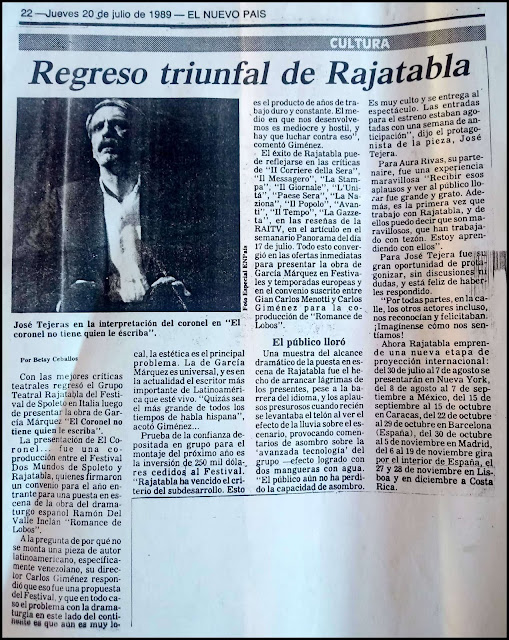"For all that, it is not a glum or boring stage piece, thanks to the theatrical imagination of Carlos Gimenez,
who adapted the 1957 novella and directed it for his company, Fundacion Rajatabla of Caracas.
The overriding atmosphere of the production is that of a dream, a stylized panorama in which an angel
of death, bearing an umbrella against the rain, becomes a recurrent symbol."
``No One Writes to the Colonel,`` the Venezuelan
production being presented here for the International Theatre Festival, opens
with a crack of thunder, a swirl of rain, and a silent funeral procession
marching solemnly across the stage.
In this highly ritualistic adaptation of Gabriel
Garcia Marquez`s novella, being staged through Sunday at the Steppenwolf
Theatre, the sense of futility and dreariness in the backwater town of a
remote, forsaken land is immediately established.
Even when the rain machine is not in action, there is
an aura of dank, sweaty despair in the air. Rotting humidity seems to be everywhere
as characters swat the mosquitoes that buzz around them and drench themselves
in cold water in order to avoid the paralyzing heat.
The skeletal colonel of the title and his birdlike
wife are two creatures on the verge of extinction, their bodies wracked with
hunger and various ugly physical ailments. Their home is a hut of corrugated
steel, their furnishings consist of little more than a hammock, a bed and a few
rickety chairs.
Still in mourning over the death of their only son,
killed while he was handing out political leaflets, the colonel and his wife
are slowly starving to death. Down to his last few pesos, the colonel waits in
vain for a pension promised to him 15 years ago for his services in the civil
war. The only hope for him is to sell his son`s prize cockfighting rooster to
the town`s diabetic, bloated political boss, but he is reluctant to part with
the bird because it symbolizes a pride he does not want to sell off.
``El Coronel No Tiene Quien Le Escribe`` (its Spanish
title) is an unusually dark and grim work by Garcia Marquez, Kafkaesque in its
presentation of a nightmarish force that is strangling the helpless individual.
For all that, it is not a glum or boring stage piece,
thanks to the theatrical imagination of Carlos Gimenez, who adapted the 1957
novella and directed it for his company, Fundacion Rajatabla of Caracas.
The overriding atmosphere of the production is that of
a dream, a stylized panorama in which an angel of death, bearing an umbrella
against the rain, becomes a recurrent symbol.
It`s a dream landscape, pierced by church bells and
illuminated by bursts of lightning, that contracts and expands through the
corrugated partitions that are silently swiveled about by the actors in order
to enclose a room in the colonel`s home or open up the whole stage.
One doesn`t need a translation to appreciate the
inventiveness of the staging, nor, for that matter, does one need to be a slave
to the flat, simultaneous English translation of the Spanish dialogue that
comes over the headsets handed out by the ushers.
The best strategy in absorbing this short, 90-minute
work is to arrive a little early and spend a few minutes reading the synopsis
printed in the program. With that general guideline in mind, one can follow the
action without distraction.
The acting by the 15-member ensemble is well worth
one`s attention.
Aura Rivas, as the colonel`s wife, is a small, stiff
little thing, clucking over her troubles and pecking about the house in her
misery.
Jose Tejera as the beleaguered colonel, on the other
hand, is a scarecrow figure of battered dignity, his lean, grizzled face marked
with a drooping mustache and his body clad in ill-fitting black suit and
scuffed shoes.
When, at play`s end, he sinks slowly to the ground
under the weight of his misery, he becomes, through the power of his physical
presence, a figure of great sorrow and great endurance.
`EL CORONEL NO TIENE QUIEN LE ESCRIBE`
A play adapted by Carlos
Gimenez from the novella by Gabriel Garcia Marquez;
directed by Gimenez,
with scenery and costumes by Rafael Reyeros, lighting by Jose Jimenez and
Reyeros, and music by Federico Ruiz. A production of Fundacion Rajatabla of
Venezuela, presented by the International
Theatre Festival of Chicago at the Steppenwolf Theatre, 1650 N. Halsted
St. Opened Tuesday and plays again at 7:30 p.m. Wednesday through Friday and 2
and 7:30 p.m. Saturday and Sunday. Running time: 1:30. Tickets are $26 to $32,
with discounts available for students and groups. Phone 312-644-3378.
THE CAST
Coronel Jose Tejera
Coronel`s wife Aura Rivas
Sabas Anibal Grunn
Post Office Employee Francisco Alfaro
Doctor Daniel Lopez
Lawyer Pedro
Pineda
Alvaro Aitor Gaviria
German Erich Wilpret
Alfonso Jesus Araujo
Sabas` wife Pilar Romero
With Norman
Santana, Gabriel Flores, Alejandro Faillace, Jose Sanchez, Rolando Jimenez.
Simultaneous translation by Jorge Busot.
By Richard Christiansen
Chief critic
June 03, 1992|
Original Source: The
Chicago Tribune




























































